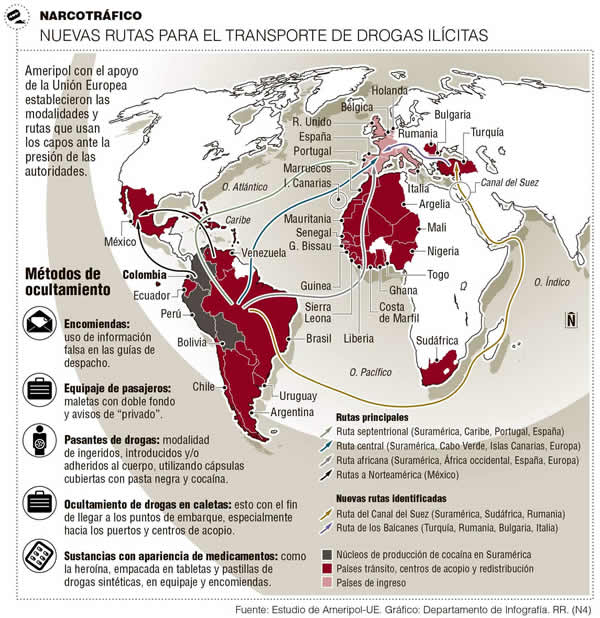A new study from the EU and Ameripol has highlighted evolutions in the global drug trade sparked by growth in the European cocaine market, and bolstered calls among Latin American leaders for a debate over drug policy.
Presented in Bogota on September 30, the report "Situational Analysis of Drug Trafficking - A Police Perspective" was the result of a collaboration between the European Union (EU) and the American Police Community (Ameripol).
The report examines the evolution of organized crime and changes in the flow of drugs as new routes into the growing European market open up. According to the report, if current trends continue, Europe could soon outstrip the United States as the world's principle market for cocaine.
The report brands sea commerce "the biggest drug trafficking threat" to the world, because containers travel everywhere and in such volumes it is impossible for authorities to search more than a small percentage. It identifies one of the main new sea routes as running between Brazil and Turkey via the Suez canal -- a route which involves circumnavigating the Horn of Africa and passing through the Gulf of Aden, where piracy is rife.
Among its conclusions, the report underlines the need for greater cooperation on an international level and calls for serious consideration of the drug policy reform debate currently taking place through Latin American.

InSight Crime Analysis
The report reinforces one of the most significant trends in cocaine trafficking of recent years -- the growth of the European market as consumption of cocaine in the United States falls. As it points out, these market forces have inevitably resulted in the development of new trafficking routes and networks to manage them, leading to the growth of organized crime in the countries used as dispatch points, transit hubs and entry points -- a worrying trend not only affecting Latin American countries such as Brazil, but also African and European countries.
The report's findings will also be a boost for Latin American presidents who have called for a discussion of drug policy reform in recent years, a debate most recently forwarded by Guatemalan President Otto Perez's speech at the recently opened 68th session of the United Nations General Assembly, in which he again called for decriminalization of drugs in order to reduce the influence of drug trafficking groups.